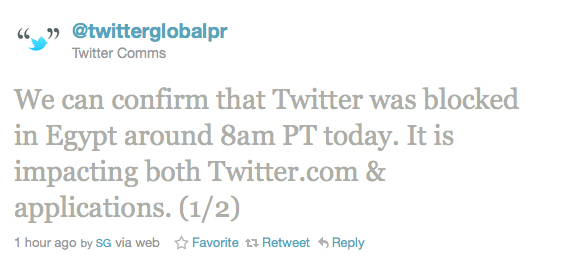 By now you’ve certainly heard what’s going on in Egypt. A protest to topple their long-serving president that seems to have begun because of the cost of food.
By now you’ve certainly heard what’s going on in Egypt. A protest to topple their long-serving president that seems to have begun because of the cost of food.
It’s sickening to me that looters are invading the museums and ruining history. There is a time and place for peaceful protests. But people taking advantage and doing damage that can’t be undone? Despicable. Not to mention people who are being hurt, or even dying, because of the unrest.
It’s definitely a life most of us can’t imagine. I live in America. The land of the free. The land of greed. The land of entitlement. The government shutting off my Internet access and iPhone? Unheard of!
What’s even more interesting to me, though, is the use of Twitter, Facebook, and YouTube to speed the process of protests in Egypt. There has been some backlash about the use of social media, with some pundits calling it a “Facebook Revolution,” as if without Facebook this wouldn’t be happening.
Let’s be real. The revolt still would have happened. But in this day of real-time communication, word of the January 25 protests spread more quickly and gained momentum that would have been hard to achieve without the social networks.
I’m reminded of the Malcolm Gladwell piece that ran in The New Yorker in early October last year. In it, he describes 1960s North Carolina where a Woolworth’s wouldn’t serve black students. The story goes that the protest to not allow blacks to sit at the bar, but instead stand at the snack counter, began with four students and, the next day, grew to 27.
During the following days, the sit-ins eventually grew to 600 people and more than five colleges taking part. Soon 70,000 students were involved and thousands were arrested and even thousands more were radicalized.
He says, ‘These events in the early sixties became a civil-rights war that engulfed the South for the rest of the decade—and it happened without e-mail, texting, Facebook, or Twitter.”
While I disagree with the rest of his view on the use of social media in today’s w0rld, he eventually gets to the point that we are not in the middle of a digital revolution. And, whether you use the tools or not, you have to agree that the revolt in Egypt would have happened without social media. The use of the tools just speeds the process.
But it also leads us to wonder…is the use of the Internet, and social media, a human right?